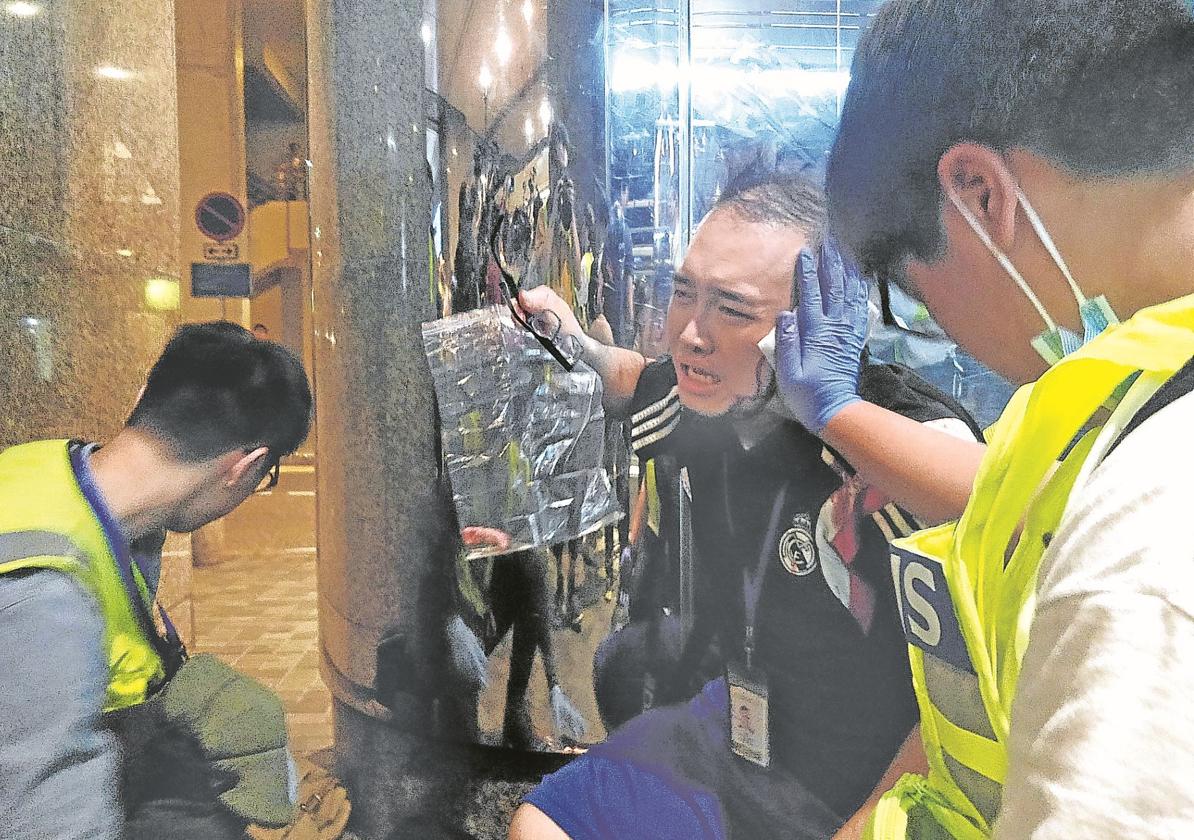Avalanche of Mass Murders in China: A Social Pressure Cooker Explodes in Stabbings
Random mass murders have become the equivalent of shootings in the United States. The Asian giant is a pressure cooker bursting due to economic, social, and mental health issues.
Zigor Aldama
Saturday, 29 March 2025, 18:30
On November 11, a 62-year-old man named Fan drove his powerful SUV to a stadium in the southern Chinese city of Zhuhai, where hundreds of people were exercising. At 19:48, he accelerated and rammed into them with the vehicle, aiming to cause maximum damage. The consequences were tragic: 35 dead and 43 injured, making it the worst violent incident of the last decade. It was revealed the next day that Fan was dissatisfied with a divorce settlement that left him practically destitute.
In a country in shock, and after criticism for the delay in reporting the incident, China's President Xi Jinping promised to "severely punish the criminal who committed this act of extreme violence," who was captured before he could commit suicide, and ordered local authorities to "prevent such incidents."
However, just five days later, in the eastern town of Wuxi, a 21-year-old approached the vocational training institute where he studied and began stabbing anyone within reach. He caused eight deaths and seventeen injuries before several police officers managed to subdue him. Apparently, the killer was frustrated by the low wages and semi-slavery conditions he endured at the company where he was interning.
Social Revenge
The Chinese government considers these indiscriminate attacks, which it labels as 'social revenge,' to be isolated incidents. However, they have multiplied over the past year and have become the equivalent of shootings in the United States, a scourge that communist leaders have always pointed to as a reflection of the American superpower's decadence. Notably, in 2024, nearly fifty random attacks were recorded. The latest, on November 19, was another vehicle attack in front of a kindergarten, fortunately without fatalities.

Some cases have even sparked diplomatic conflict. On September 18, a Japanese child was about to enter school in Shenzhen, China's most advanced city, when an unknown assailant approached and stabbed him to death. From Tokyo, the murder was attributed to the official xenophobia of the Chinese government, which in its push for nationalism always targets Japan. This was highlighted by the fact that the day commemorated the incident that led to Japan's occupation of the Manchuria region in the 1930s.
Moreover, just a few months earlier, a Japanese mother and her child were attacked, also with a knife, while waiting for a bus in Suzhou. They were injured to varying degrees, but a local woman who tried to help them died. Just weeks earlier, four American teachers survived a similar attempted murder in a park in Jilin. Once again, analysts concluded that the attacks had an element of hatred towards foreigners.
But it is evident that this is only a partial explanation. These incidents have even transcended the borders of the Asian giant. On October 1, a 23-year-old Chinese national attacked children at a kindergarten in Zurich.
"In Europe, society can relieve pressure by demonstrating and protesting. In China, it cannot."
Why is this happening, and why is it becoming more frequent? These are questions many are asking, both inside and outside China. "I think the answer is complex. There are many factors driving these sudden outbreaks of violence," comments a Sociology professor at Fudan University in Shanghai, who prefers to remain anonymous because "it's a very thorny issue with political ramifications."
Indeed, the first thing the academic points out is a significant difference between China's systems and those of liberal democracies. "In Europe, for example, society has many ways to relieve pressure that may arise in times of crisis. They can demonstrate, protest, and even get involved in political decision-making processes to solve what frustrates them. In China, however, all that is banned or heavily restricted. It's one of the reasons why discontent grows until it explodes," he notes.
Social Factors
But that's only part of the explanation. "Tension has increased due to non-political factors: we are in an economic crisis that is particularly felt in the real estate sector, where most Chinese have their savings, and work pressure is also growing. Many people are at their limit. Add to that the demographic impact. Here we don't have a social safety net like in Europe, and benefits are minimal, so the burden of caring for parents and grandparents falls on young people who are stretched to their limits. As if to have children," he comments wryly. Moreover, youth unemployment has soared to around 20%.
As if that weren't enough, the debate on mental health is still taboo in many areas of this socially conservative country. "Not long ago, those with mental illnesses were tied up in the basement. Now the issue is talked about more, but it remains something hidden under the rug, despite the pandemic and zero-COVID policy exacerbating the problem. Additionally, there is a dangerous shortage of psychological and psychiatric treatment," explains the professor.

The phenomenon of these 'social revenge attacks' has been little studied. In 2019, academics Ma Ziqi and Zhao Yunting delved into the profiles of those who committed them and concluded that most feel excluded from society and find no way to be heard or solve their situation. This desperation leads them to unleash their fury on anyone, randomly. Often against the most defenseless: numerous attacks have occurred against kindergartens and primary schools.
Personal Crises
Without a release valve, the pressure cooker explodes. "Compared to shootings in the United States and its population, ours are isolated cases. But since we have 1.4 billion inhabitants, they can occur more frequently. In any case, China remains a safe society," says the Shanghai academic, concerned, however, about the possibility of incidents occurring more frequently.
0.46 homicides
per 100,000 inhabitants is China's crime rate. In comparison, Spain's reaches 0.68, the United States' soars to 6.38, and Mexico tops the list with 26.11.
According to Xiang Biao, director of the Institute for Social Anthropology at the Max Planck Institute, one of the main problems is that "the Chinese population has forgotten how to face personal crises." Xiang emphasized in statements to the Swiss newspaper NZZ that the definition of success in the country is too rigid: getting good grades, making a lot of money, getting married, buying a house, and having children. "This equation is very fragile. If the marriage breaks down, for example, people lose their money and social status," he argues.
Perhaps for this reason, some regional governments are proposing the monitoring of individuals likely to commit these crimes, which would include divorced, unemployed, or unstable individuals. Many experts criticize that the proposed solution is always punitive, the threat of punishment, and that it has little effect on people who have lost all hope in life. Meanwhile, the social roots of the problem are not addressed.
"At least, in China, we don't have firearms"
Faced with the increase in knife attacks, China decided a few years ago to introduce mandatory registration of these bladed weapons, which in many restaurants are even kept chained so they cannot be removed by anyone. "At least, in China, we don't have firearms," comments an internet user comparing recent events with those in the United States. And he is right: the use of firearms in the Asian giant is minimal, and many times these crimes are committed with homemade weapons. "China has become one of the safest countries in the world and with one of the lowest rates of gun violence," highlighted the country's delegation at the United Nations. The homicide rate is 0.46 per 100,000 inhabitants, while in Spain it is slightly higher –0.68– and in the United States, that variable soars to 6.38. Mexico leads the ranking with 26.11.
"The goal should not be to sentence to death those who perpetrate these heinous crimes; the goal should be to prevent them. On the surface, our country appears stable and calm, but beneath that facade, there are many turbulences," wrote a Weibo social media user in response to the information about the Zhuhai incident. "It's cheaper to execute criminals than to make mental health plans to prevent them," responded another internet user, who also denounced the lack of information about these cases in the media, which downplays their importance. "They think what is not seen does not exist, but it is so big that it cannot be covered up."




